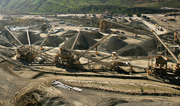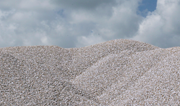About Vulcan
Company History
Over 100 Years of Dedication
Vulcan Materials Company became a publicly traded company with trading beginning on January 2, 1957. Its predecessor companies date to the early 20th Century.
| 1909 |
Birmingham Slag Company, a family-owned construction materials company, is founded by Henry Badham and Solon Jacobs. |
| 1916 |
Charles Lincoln Ireland, a banker from Ohio, purchases Birmingham Slag and sends his sons, Glenn, Eugene and Barney to Birmingham to manage the new business. |
| 1932 |
Birmingham Slag remains profitable under the Ireland’s leadership until 1932, when the world economy is affected by the Great Depression. After the Depression, Birmingham Slag Company begins to grow in earnest. |
| 1939 |
Birmingham Slag becomes a major supplier to Tennessee Valley Authority projects. |
| 1942 |
Birmingham Slag begins a three-year contract providing construction materials for the war effort, including Oak Ridge, Redstone Arsenal and other major military projects. |
| 1944 |
Birmingham Slag enters into a joint venture with Lambert Brothers, Inc., one of the South’s largest aggregates businesses, located in Knoxville, Tennessee. The strategic joint venture provides significant and profitable growth for Birmingham Slag. |
| 1950 |
Birmingham Slag has 600 employees, sales of more than $20 million, and net profits between $1.5 million and $2 million per year. |
| 1951 |
Glenn Ireland’s son Charles is elected president of Birmingham Slag. Tremendous opportunities are envisioned under the Eisenhower Administration’s Federal Highway Program. The Company begins plans to expand rapidly in order to become a major supplier of aggregates needed under the highway program. |
| 1956 |
Bernard A. Monaghan, a prominent lawyer and former Rhodes Scholar and World War II hero joins Birmingham Slag. He helps engineer a merger with the Vulcan Detinning Company of Sewaren, New Jersey, so that Birmingham Slag can become a publicly traded company under Vulcan Detinning’s listing on the New York Stock Exchange. The new company is renamed Vulcan Materials Company, gaining access to the capital markets that will help it grow. |
| 1957 |
Vulcan First day of trading January 2, 1957. Vulcan Materials Company asks stockholders to approve a merger with nine companies at the same time – Union Chemicals, Lambert Brothers and seven other aggregates or related corporations. Fortune magazine observes that the prospectus issued for the transaction is one of the most complex ever in American commerce. |
 |
| 1957 |
Vulcan’s Chemicals Division is formed as a result of the merger with Union Chemicals and Materials Corporation. |
| 1958 |
Bernard Monaghan becomes executive vice president of Vulcan Materials Company and is later elected president and CEO of the Company. A decentralized organizational structure is developed creating nine operating divisions and a corporate office. |
| 1959 |
Vulcan purchases W.E. Graham & Sons, a North Carolina family-owned aggregates and general contracting firm. |
| 1968 |
Vulcan builds a world-class chlorinated organic chemical plant on a greenfield site in Geismar, Louisiana. |
| 1975 |
Vulcan’s Chemicals Division moves its headquarters from Wichita, Kansas, to Birmingham, Alabama. |
| 1980 |
Vulcan acquires the Port Edward, Wisconsin, chloralkali plant from BASF. |
| 1981 |
Companywide sales reach $783 million, ranking Vulcan Materials Company 367 in the Fortune 500. |
| 1981 |
Vulcan’s Chemicals Division begins using the trade name Vulcan Chemicals. |
| 1984 |
Vulcan constructs and operates the first commercial-size membrane cell chloralkali facility in the U.S. at its Wichita, Kansas, plant. |
| 1987 |
Vulcan and a Mexican partner, Grupo ICA, form the Crescent Market Companies to produce high-quality limestone at a quarry on the Yucatan Peninsula of Mexico for shipment to various markets primarily along the U.S. Gulf Coast. The joint venture includes a shipping company and a U.S.-based sales distribution company. |
| 1987 |
Vulcan acquires White’s Mines, Inc. and affiliated companies, greatly expanding Texas construction materials operations. |
| 1990 |
In its largest acquisition to date, Vulcan acquires the massive Reed Quarry, near Paducah, Kentucky. In addition to adding capacity and reserves, the Reed acquisition gives Vulcan access to new stone markets via barge shipments along the Mississippi River and Tennessee-Tombigbee Waterway. |
| 1996 |
Donald M. James becomes president of Vulcan Materials Company. In 1997, Mr. James becomes CEO and is elected chairman. He serves as CEO until 2014 and Executive Chairman until January 2015. |
| 1999 |
Vulcan acquires CalMat, Inc., expanding the Company’s aggregates operations into California, Arizona and New Mexico and making Vulcan one of the nation’s leading producers of hot-mix asphalt and ready-mixed concrete. The acquisition makes the Company the largest aggregates and asphalt producer in California, a position it holds to this day. |
| 2000 |
Vulcan begins construction of a new plant in Geismar, Louisiana, to produce HCC 240fa, a feedstock for a new generation of ozone-friendly hydrofluorocarbons (HFCs) used in insulation and construction foam products. |
| 2000 |
Vulcan acquires Tarmac America’s aggregates operations, significantly extending the geographic scope of the Company’s operations in the eastern United States. |
| 2001 |
Vulcan acquires its partner Grupo ICA’s interests in the Crescent Market Companies, an international joint venture that produces aggregates in the Yucatan Peninsula and transports and sells them in various markets primarily along the U.S. Gulf Coast. |
| 2005 |
Vulcan sells its Chemicals Division, divesting its Chloralkali assets in Wichita and Geismar to Basic Chemicals, LLC, a unit of Occidental Chemicals, and its Port Edwards, Wisconsin facility to the Canadian Company, ERCO Worldwide. |
| 2007 |
Vulcan celebrates its 50th anniversary as a publicly held company. |
| 2007 |
Vulcan Materials Company acquires Florida Rock Industries, Inc., which was originally founded in 1929 by Thompson S. Baker. The acquisition adds aggregates facilities in Florida and Georgia, and cement and concrete operations in Florida, Georgia and the Eastern Seaboard, including the District of Columbia. |
| 2013 |
Vulcan divests its cement and concrete businesses in Florida and South Georgia to Cementos Argos, with Vulcan retaining all of the Company’s aggregates facilities in Florida and entering into a long-term aggregates supply agreement with Argos. |
| 2014 |
J. Thomas Hill is elected president and CEO of Vulcan Materials Company. In 2015, Mr. Hill was elected Chairman of the Board for the Company. |
| 2014 |
Vulcan acquires aggregate operations that enhance the greater Dallas market. The Company completes the acquisition of one quarry in southern Oklahoma with rail distribution capabilities into Texas and two distribution yards in the Dallas area. |
| 2015 |
The Company implements a new operational structure from four operating regions to eight divisions. The new organizational structure further enhances the Company's ability to serve customers, increase profitability and continue to capture strategic growth opportunities across its footprint. |
| 2015 |
Vulcan concludes an asset swap with CEMEX, exchanging Southern California ready-mix concrete operations for 13 asphalt plants, primarily in Arizona. This further expands the Company’s strategic focus in the Arizona asphalt market. Under the agreement, Vulcan continues to supply aggregates to the concrete operations. |
| 2015 |
The Company completes the acquisition of three aggregates facilities and seven ready-mixed concrete operations in Arizona and New Mexico, and one aggregates facility in Tennessee. |
| 2016 |
Vulcan launches MyVulcan.com, a new online customer service center, giving customers direct control of their Vulcan accounts. The website allows customers to view tickets and orders, track orders and pay bills online. |
| 2016 |
Vulcan acquires an asphalt plant in New Mexico and aggregates facility in Texas. |
| 2016 |
Vulcan receives approval for new greenfield site quarries in the Central Valley of California, Medina County in Texas and greater Columbia in South Carolina. |
| 2016 |
The Company completes the acquisition of a distribution business in Georgia to complement its aggregates logistics and distribution activities. |
| 2017 |
Vulcan enters the Tennessee asphalt market through the acquisition of several asphalt mix operations and a construction paving business, from LoJac Holdings Corporation. |
| 2017 |
Vulcan enters the Northern California ready-mixed concrete market in the San Francisco Bay Area through the acquisition of Shamrock Materials. |
| 2017 |
Vulcan reaches a definitive agreement with SPO Partners to acquire its aggregates business, Aggregates USA LLC. Aggregates USA LLC operates 31 facilities serving high growth markets in Georgia, Florida, Tennessee, South Carolina and Virginia. |
| 2018 |
Vulcan strengthens its asphalt position in Texas by acquiring additional asphalt mix operation and a construction paving business. |
| 2018 |
Vulcan exits the Georgia ready-mixed concrete market, selling its assets to Thomas Concrete Group in exchange for long-term aggregates supply agreements. |
| 2018 |
The Company enters the Alabama asphalt market and construction paving business through the acquisition of all businesses owned by McCartney Construction Co, Inc., R.C. Smith Companies, Ltd and DMG Equipment Company, LTD. |
| 2019 |
Vulcan launches its updated Corporate Social Responsibility website. |
| 2019 |
Vulcan begins operation of the Southwest Gulf Railroad, serving Houston markets from its new Medina County, Texas quarry. |
| 2021 |
Vulcan Materials Company acquires U.S. Concrete, significantly expanding the Company's footprint to 22 states, four countries and increases the geographic reach in attractive growing metropolitan areas. The acquisition significantly increases our ready-mix operations in California and Texas and expands our geographic scope into New York and New Jersey. Together, Vulcan is positioned to leverage our unique and irreplaceable asset base and blue water network, making Vulcan the most valuable aggregates franchise in the world. |




